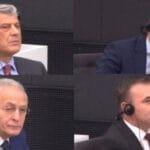The Agency for the Administration of Confiscated and Seized Assets of Kosovo still does not have a court decision to administer the millions of euros that the Kosovo police said they confiscated from several financial institutions in the north of the country on May 20.
“Without receiving a decision from the court, we cannot do anything. We act according to the decision of the competent court”, says the deputy general director of this agency, Enver Krasniqi, briefly for Radio Evropa e Lire.
On this topic, REL also contacted the Ministry of Justice, within which the Agency for the Administration of Confiscated and Seized Assets operates, but it did not respond.
For now, it is not clear which court has jurisdiction over the case.
A day earlier, Kosovo police closed six facilities of Serbian financial institutions in the northern part of the country, inhabited by a majority of Serbs.
During the action, she said she confiscated over 2.2 million euros in total – among them also dinars, francs and American and Australian dollars.
The action took place a few days after the Central Bank of Kosovo announced that the transitional period for the implementation of its regulation, which prohibits the use of the Serbian dinar in Kosovo, has expired.
Radio Free Europe addressed the Kosovo Police with questions about where the money received from Serbian financial institutions in the north is and whether it has been confiscated or seized, but did not receive an answer. She only suggested that her May 20 communiqué be taken for reference.
Confiscation means the permanent seizure of property by a final order from the competent court or other competent body in accordance with the law in force, while sequestration means the seizure of property by the competent body until the final decision of the court.
What now?
“In this particular case, we are dealing with sequestration and not confiscation, which means temporary freezing of these funds, until all legal procedures are completed,” Gëzim Shala, researcher at the Kosovo Institute for Justice, told Radio Free Europe.
According to him, if it is proven that those funds were derived from illegal events, then “a decision can be taken to confiscate them”, which means “the final taking of the money owned by the Republic of Kosovo”.
Shala says that the investigative phase – until the final decision of the competent court – can last up to three years.
In the Code of Criminal Procedure of Kosovo, it is also stated that the seized property is kept adequately by the police, until the issuance of the court order for detention.
Criticism of Kosovo
The US Department of State (Dash) said that it is disappointed with the action of the Kosovo police in the Serbian financial institutions in the north and, according to it, it escalates the tensions in the area inhabited by Serbian majority.
The European Union reacted similarly.
“Monday’s operations prove once again that Kosovo authorities prioritize unilateral and uncoordinated actions more than cooperation with friends and allies on the ground,” said spokesman Peter Stano.
In Serbia, meanwhile, Prime Minister Milosh Vučević described the action as a “barbaric act” that, as he said, “directly threatens the survival of the Serbian people” in Kosovo.
The former Minister of Justice of Kosovo, Jonuz Salihu, agrees that the issue takes on a political connotation and doubts that it can be resolved through the legal basis of Kosovo.
“I believe that the sequestration of this money should be the subject of talks between Kosovo and Serbia, with the mediation of the EU”, he says for Radio Free Europe.
Last week, the chief negotiators of Kosovo and Serbia ended without success the seventh round of talks on the issue of the use of the Serbian dinar in Kosovo.
The CBK regulation banning the dinar, making the euro the only means of payment in cash, entered into force on February 1, while on May 13, the CBK said that the transitional period for its implementation has ended.
The regulation increased friction between Kosovo and its Western partners, who called for its suspension until the Serbian community, which for years has been accepting various payments in dinars from Serbia, adapts to the new practice.
The Kosovo authorities, however, did not back down.
The police said that the purpose of their action in the north, on May 20, was “establishing order and legality”.
From February 1, Kosovo Customs also announced several times that it has stopped the entry of dinars from Serbia to Kosovo, on the grounds that it does not have the approval of the CBK.
At least until May 17, according to REL’s reports from the field, payments in Serb-majority areas in Kosovo continued to be made both in euros and in dinars. /REL/







